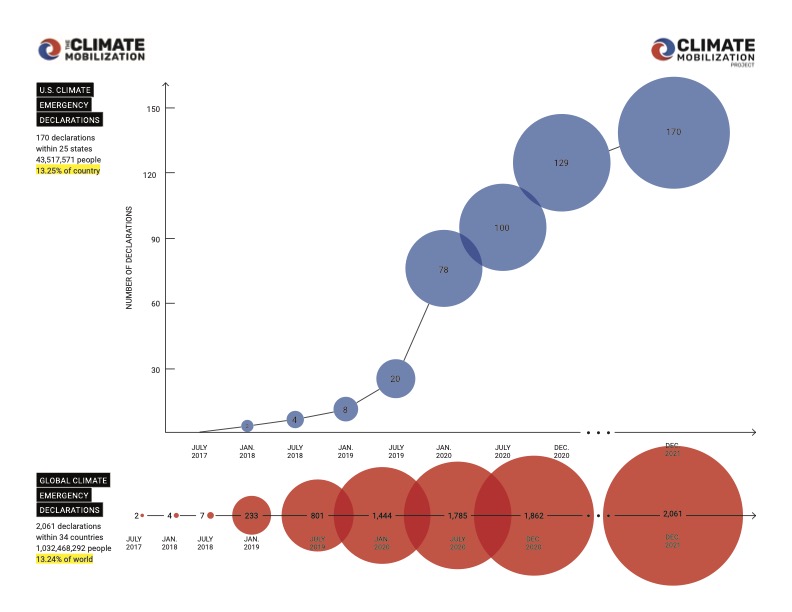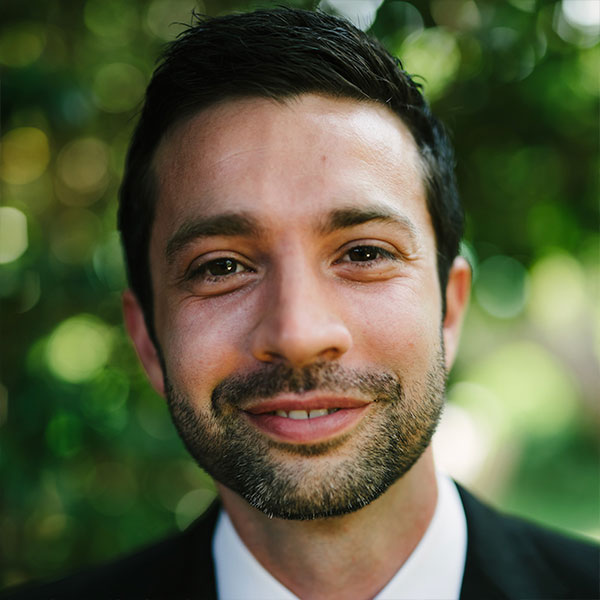Climate Emergency Movement Updates
The Climate Emergency Movement has gained momentum in recent weeks with four new declarations in the U.S. alone, bringing the total to 111 declarations nationwide within 24 states. 11.3% of the US population now lives in a jurisdiction that has declared, and globally there have been 1790 declarations of climate emergency within 30 countries.
Congratulations to organizers in Saco, Maine where the town council passed a declaration on 9/21, Provincetown, Massachusetts, where a declaration was passed in a town meeting on 9/21, and Yolo County, California, whose Board of Supervisors passed a declaration on 9/30.
The Board of Supervisors of Contra Costa County, California also passed a resolution on 9/22 which included a declaration of Climate Emergency. TCM executive director Matt Renner, who lives in Richmond, California, spoke in support of the county’s commitment to moving away from a fossil fuel-based economy in the region, saying in part “The oil industry is in free fall, and demand is not coming back for their product. The writing is on the wall for the four Contra Costa County oil refineries.”
Supriya Patel, climate emergency organizer, Climate Mobilization ally, and 9th-grader, authored an op-ed in the Sacramento Bee calling for a declaration of climate emergency in her city: “The youth have had enough. It’s time to declare a climate emergency in Sacramento County.”
New York City’s Climate Mobilization Act has been rated the United States’ most ambitious local climate action initiative, according to a new policy scorecard by the American Council for an Energy Efficient Economy (ACEEE). Importantly, 11 of the top twenty cities on the scorecard have declared a climate emergency.
Read more about how climate emergency declarations are driving meaningful climate policy change in local governments across the pond in Are climate change declarations delivering change?
Politics, science, covid-19, and climate
According to the World Health Organization (WHO), our air pollution crisis is even more deadly than the covid-19 pandemic, resulting in approximately 7 million fatalities annually. Globally, nine out of 10 people are breathing air that does not meet WHO’s guidelines for limiting pollutants, and the outcomes are even worse for people in low-and middle income countries whose governments continue to build their industrial power with environmentally hostile production. The climate emergency is a public health crisis, and it is our world’s poor and disenfranchised who are bearing the brunt of the consequences.
More than 4 million acres of California have burned this year due to increasingly intense wildfires fueled by climate change — more than double the previous record, set in 2018. Slate details how coverage of wildfires in the west is being influenced by conspiracy theory and anti-environmentalist rhetoric.
Climate scientist Zeke Hausfather (@hausfath) explains how we have increasingly limited emissions pathways to net zero emissions before reaching dangerous levels of global warming, underscoring the absolute urgency of acting immediately.
During Wednesday’s Vice Presidential debate, candidates and the moderator ignored the realities of the climate emergency impacting millions of people across the United States, from fires in the West to hurricanes across the Gulf Coast. Candidates were not asked about how best to rapidly eliminate greenhouse gas emissions from the American economy — instead they were asked “do you believe in climate change?”
President Trump has also refused to participate in the second Presidential debate if it were hosted virtually due to coronavirus concerns. With Trump back working in the White House despite his active infection, E&E News draws connections between Trump’s downplaying of the pandemic and climate denial.
Connect with TCM
If you missed our campaign launch and want to take action around the 2020 election, check out last week’s #ItTakesAMovement live stream on TCM’s Facebook page, and sign the TCM pledge to vote, help get out the vote, and defend democracy. Join the campaign here.
Climate Mobilization founder Margaret Klein Salamon is writing a series for the Psychology Today Blog looking at the personal side of the climate crisis and answering reader questions about how to overcome climate-related dilemmas. Have a question for Margaret? You can submit it here!
Join the Montgomery County, Maryland chapter of The Climate Mobilization, who led their county to declare a climate emergency back in 2017, as they explore eliminating fossil fuel emissions locally. The webinar, Pathways to a Climate Positive County – Part 2. Buildings, consumption & mobility: making our buildings, vehicles, and energy network climate positive by 2027 will help organizers from around the country gather insights and build connections for local organizing work. The event is Tuesday, October 13th from 7:30 – 9:00 pm ET. Register for the webinar here.
Long Reads
For a bleak look at our possible future, and an invitation to action, check out Three Scenarios for the Future of Climate Change by Elizabeth Kolbert for The New Yorker.
The online environmental magazine Grist presents an Illustrated Guide to understanding the connection between environmental justice and police violence against Black and brown people.

















